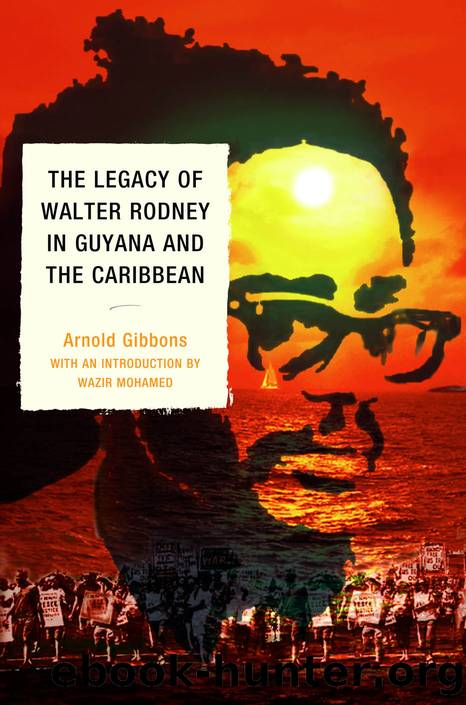The Legacy of Walter Rodney in Guyana and the Caribbean by Gibbons Arnold;

Author:Gibbons, Arnold;
Language: eng
Format: epub
Publisher: UPA
Published: 2011-08-15T00:00:00+00:00
Culture and the State.
For Rodney, culture was an ideological frame of reference that served to mobilize the masses for definitive political goals. Black power and all that entails was less about race and about racialismâalthough both are necessary stages requiring protest and refutationâthan about political power. It was indeed through political power and a synthesis of common interests that historical revision takes place and a people can have understanding of its destiny. âThe road to Black Power . . . must begin with a revaluation of ourselves . . . and with a redefinition of the world . . .â103 Needed though was confidence to take that leap from servitude of mind to independence of spirit; knowledge of Africa and its achievements in science and the artsâa cultural endowmentâwas central to the task.
Indeed, this knowledge is firmly rooted in the literature of the Caribbean and the works of its poets have reflected the sensitivity and longing for the African past. Edward Braithwaite explored the question of exile and what it contributed to psychic experience. The exile was, of course, that of the nations of Africa, which had been transported across the seas to the Americas. The theme is rich, rewarding and present. It assumes permanence in the ethos of the Caribbean; and a restlessness of spirit prevails over the mundane affairs of everyday and the demands of exile itself. George Lammingâs The Pleasures of Exile, traces the evolution of the colonial and his rise to an understanding of himself through study and exposure to an alien environment, the substance of which is already known in the colonies. The psychological dimension is the uprooting of the spirit, which is in need of re-fertilization from a bankruptcy caused by rootlessness. For Braithwaite it is a âre-education of a Black mind towards self-fulfillment.â104
Cezaire extols the traditional ways in Le Tour au Pay Natale, in its way a re-education too, but an affirmation of life, threatened by the rootlessness of exile, uncertain feeling, and the cultural impositions of capitalism. For Rodney, â. . . the struggle (to free and mobilize black minds) will not wait until the re-education of the mass of the black people reaches an advanced stage.â105 Braithwaite speaks about the need â. . . to connect my history with theirs, the bridge of my mind now linking Atlantic and ancestral homeland and heartland.â106 Exile, renewal and regeneration of spirit is shared by Caribbean thinkers as a response to the hazards and depredations of alien cultures. Rodney warned about this, as he analyzed Fanon: âFanon exposed the limits of Western culture and its counter-productive aspects as far as a Black revolutionary was concerned.â107
Rodneyâs rejection of negritude was less a failure to acknowledge the romantic side of the movement, or indeed its redeeming characteristics, than the irrelevance of its contentions. In the total scheme of things, negritude was a bourgeois preoccupation that did not go far enough to explain the more important and substantive realities, which people must face up to for their liberation.
Download
This site does not store any files on its server. We only index and link to content provided by other sites. Please contact the content providers to delete copyright contents if any and email us, we'll remove relevant links or contents immediately.
| Argentina | Bolivia |
| Brazil | Chile |
| Colombia | Ecuador |
| Guyana | Paraguay |
| Peru | Suriname |
| Uruguay | Venezuela |
Cat's cradle by Kurt Vonnegut(14768)
Pimp by Iceberg Slim(13787)
Underground: A Human History of the Worlds Beneath Our Feet by Will Hunt(11842)
4 3 2 1: A Novel by Paul Auster(11800)
The Radium Girls by Kate Moore(11626)
Wiseguy by Nicholas Pileggi(5323)
American History Stories, Volume III (Yesterday's Classics) by Pratt Mara L(5139)
Perfect Rhythm by Jae(5076)
The Fire Next Time by James Baldwin(5024)
Paper Towns by Green John(4805)
Pale Blue Dot by Carl Sagan(4626)
A Higher Loyalty: Truth, Lies, and Leadership by James Comey(4556)
The Mayflower and the Pilgrims' New World by Nathaniel Philbrick(4285)
The Doomsday Machine by Daniel Ellsberg(4250)
Killers of the Flower Moon: The Osage Murders and the Birth of the FBI by David Grann(4192)
Too Much and Not the Mood by Durga Chew-Bose(4097)
The Sympathizer by Viet Thanh Nguyen(4096)
The Borden Murders by Sarah Miller(4025)
Sticky Fingers by Joe Hagan(3916)
